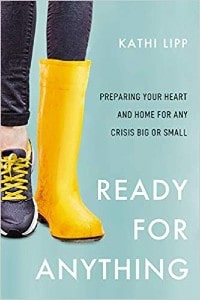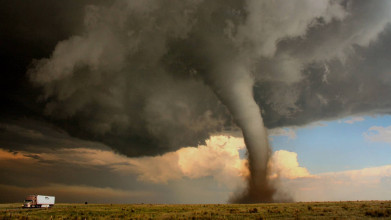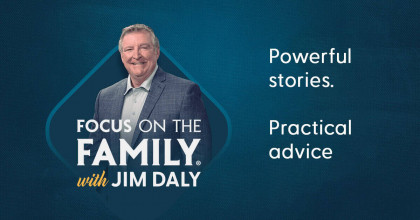Preview:
Kathi Lipp: Have that conversation, what’s going to be most important to you? Let’s make the decisions now while our adrenaline is not going off the charts, while we’re not in fear for our life. Let’s make decisions now so that we can, um, be able to be that help to the people who need it in the emergency.
End of Preview
John Fuller: Hmm, that’s Kathi Lipp and she’s our guest today on Focus on the Family with Jim Daly. We’re glad to have you join us. I’m John Fuller.
Jim Daly: John, emergencies can strike any of us at any time, and we’re never promised an easy life without any worries as hard as that is to accept. That’s said, I want to let our friends in California know that we are praying for you. Those fires in the Los Angeles area have been devastating, and we know you’re all feeling it. Uh, we also remember our friends in North Carolina who dealt with flood damage last September. These kinds of situations are exceptionally hard since we have no control over them. How we react to these circumstances is what’s important. We can either live in fear or we can live in wisdom. And we wanted to come back today to a program we recorded with our friend Kathi Lipp. And as you will hear, she dealt with a wildfire near her house, which prompted her to learn how to be ready for anything. And she captured her learnings in a book by a similar title.
John: Yeah, this is a very timely conversation. Kathi is a popular speaker and author. She’s the host of Clutter Free Academy, the podcast, with Kathi Lipp. And the title of the book she wrote that is really an essential read for us in today’s world is called Ready for Anything: Preparing Your Heart and Home for Any Crisis Big or Small. Now, we’ve got that book here at Focus on the Family. Uh, just stop by our website, focusonthefamily.com/broadcast.
And Jim, we’re gonna pick it up as you welcomed Kathi to the studio.
Jim: Kathi, welcome back to Focus on the Family.
Kathi: Always my favorite place to be.
Jim: Now, it might be that John says you’re our favorite guest because you consistently bring bagels to eat.
John: (Laughs).
Jim: (Laughs).
Kathi: I’m not dumb.
Jim: It’s a calling card, isn’t it?
Kathi: Like I want people to be –
John: We love it.
Kathi: … excited when I enter the room.
Jim: (Laughs).
John: (Laughs).
Kathi: (Laughs).
Jim: Well, it’s always fun to see you. Um, you stated in the book, uh, something that, that I mentioned in the open. You had a fire coming at you, but it wasn’t a wildfire. I think it was a house fire.
Kathi: Yeah, so-
Jim: With a neighbor, what went on and what got your attention in that experience?
Kathi: This was years ago, and my husband and I live in a townhouse with our four kids, and we were both working from home that day and somebody comes knocking on our door and is screaming, “Fire.” And so –
Jim: Gee.
Kathi: … we… Yeah.
Jim: Not a good way to start the day.
Kathi: Not a great way. So we grab the dog and head out to the grass where we’re standing out there and I look two doors down and it’s engulfed in flames.
Jim: Mm.
Kathi: It was terrifying.
Jim: Yeah.
Kathi: It was just terrifying. And so we’re standing out there and we’re sitting and we’re thinking, and you know, at this point, all of our kids are in college. They’re doing their own thing, but it was our son, Jeremy’s first day of school. And I said to Roger, “There’s no way that Jeremy came back from school today, right? And he said, “No, no, no. We would’ve heard him.” And Roger’s just standing there. And then suddenly my husband goes into the burning building and I’m like, “What are you doing?” And about a minute later he comes out and I’m like, thank God. And Jeremy is behind him.
John: Oh my.
Jim: So he had come in late and you guys didn’t notice him?
Kathi: We didn’t notice that he –
Jim: Oh my goodness.
Kathi: … had come in. So we are literally the people who grabbed the dog and left the kid in a burning building.
Jim: Okay.
Kathi: And that’s not what you want to be doing in an emergency. And so, um, it was at that point we’re like, yeah, we need a better plan. I, we’re standing out there, all of us in our bare feet. I have my phone, but we don’t have, we don’t even have a leash for the dog.
Jim: Yeah.
Kathi: Who’s 40 pounds, you know. It’s like, what do you do now? Our neighbor two doors down lost their entire house.
Jim: Yeah.
Kathi: Um, the one in between us, she moved in the night before.
Jim: Oh my goodness.
Kathi: We’d never even met her. So she came home and they had to break down her door to make sure she was, there was nobody inside. So she kept going to her house and then leaving and coming back because she’s like, well, that can’t be my house. There’s, there’s, you know, plywood over my front door.
Jim: Right, it’s surreal.
Kathi: Yeah. It just, you can’t think in those moments.
Jim: Right.
Kathi: So you, you have to think beforehand in order to say what happens when a crisis comes, what do I do.
Jim: Yeah. You, you had a travel experience, which I loved.
Kathi: (laughs).
Jim: Um, where –
Kathi: I did not.
Jim: I mean, you laughed about it.
Kathi: Yes.
Jim: Which was good.
Kathi: Yes.
Jim: I, I would hope that I could laugh about something as horrific as what you went through. But, uh, what happened and how did that add to the fuel for you to think about a plan?
Kathi: Yeah, so I was flying cross country. I was gonna be speaking at a charity event, uh, one that’s pretty near and dear to my heart. And we get up in the air and we, it turns out we have to land in a different airport than where we were supposed to be. And I needed to be at this charity event the next morning ’cause I’m speaking for this group of people. And I’m not used to being on the East Coast. I don’t know how to maneuver things. Well, every hotel room, every rental car, everything was gone because people who were smarter than me we’re making reservations in the air. Like I didn’t know. Yeah. So I landed this airport, I end up spending the night at the airport, and I put out a call to all my friends on Facebook. It’s like, okay, how can I get from Pennsylvania to Virginia? Like, how does this happen?
Jim: My goodness.
Kathi: And now if you’re on the East Coast, maybe you’re like, oh, I could do that in my sleep. I’m from California. Like, we don’t do trains. That’s not our thing. And so somebody suggested the train, uh, me and a group of other people spent the night at the airport, we formed our own party.
Jim: (laughs).
Kathi: And we, we traveled over there. We got Ubers, we get on the train and I finally get like two hours of sleep while I’m on the train. By the way, I don’t have any of my luggage. So the person who’s picking me up for the event takes me to Target. And I get together. I know you’ve done this, you’ve done this.
Jim: (Laughs). Yes, it happens.
Kathi: Yeah. Um, at Walmart, you know, in the middle of the night –
Jim: Yeah, wherever you can grab clothes.
Kathi: … getting toothpaste.
Jim: Yeah, exactly.
Kathi: Yeah. Um, I show up, I do the event on no sleep, and then I’m flying out the next day and my flight’s been canceled. And the person who is –
Jim: The agent.
Kathi: Agent.
Jim: The poor recipient of all this angst.
Kathi: I just start cracking up. Like, I mean, what else are you going to do at this point? Uh, it’s so easy to get angry about, but this is not in her control. And I just start laughing. And she says, “Why are you laughing?” And I said, “I came here to speak to a church.” And I told her everything. And she goes, “Well, that’s why you’re getting all this opposition because you’re a preacher.” And this woman gave me a sermon.
Jim: (laughs).
Kathi: Right there at the ticket counter and she encouraged me and she says, “You know what? This is gonna be a story that you’re gonna use about God’s provision for years to come.” And here I am on Focus on the Family. And by the way, those agents, four agents got together, all of them believers and said, we’re gonna get you home. We’re gonna get you back to your husband. Now it took about a day and a half, but I got h-, I was one of the few people that weekend to actually get home.
Jim: That’s so funny. I remember when I was first hired at Focus in 1989, I was on a training trip with somebody.
Kathi: Uh-huh.
Jim: And we got to the rental car counter and they had lost the reservation. And so we’re there. And this colleague was very upset.
Kathi: Yeah.
Jim: And kind of going at the agent.
Kathi: Yeah.
Jim: Talking about, you know, being outta your control. I’m kind of quiet ’cause I’m the newbie, right? Yeah. So I’m just listening to how this goes. And then the agent goes, “Oh, you work for Focus on the Family. I love that radio program.” (Laughs).
Kathi: (Laughs).
John: (Laughs).
Jim: And this person’s demeanor changed instantly. (Laughs).
Kathi: (laughs).
Jim: Oh, well thank you for listening. Yeah. So do you happen to have a Volkswagen? (laughs).
John: (Laughs).
Kathi: (Laughs).
Jim: Well, I mean, it was so funny.
Kathi: It’s so true. But you know what, what, what are our tools in that situation? We can, if we get angry, we have lessened the amount of tools we have. But when we approach a situation like that, believing in God’s abundance, believing that, you know, if we pray we show up, we’re trying to serve the people who are trying to serve us, we can actually get a lot farther in these emergency situations.
Jim: Well, and I like that reminder that these are things that are out of your control and they’re out of, usually out of that service person’s control.
Kathi: Exactly.
Jim: Actually, and it’s so much nicer to respond outta the spirit than the flesh.
Kathi: Yeah.
Jim: But it really, it does test your mettle.
Kathi: Well, and I don’t know about you, but when I’m tired or hungry.
Jim: (laughs).
Kathi: Or hot, um, you know –
John: Or breathing.
Jim: (Laughs).
Kathi: Or gr-, yeah, exactly. These are all things that make me not be my best. But I can remember I get to choose my attitude in the midst of it.
Jim: Yeah. Kathi, you, I love the fact that you, um, do this incrementally this awareness. So it’s not just one instance like the house fire and, you know, standing out on the lawn with your 40 pound dog and wondering where your son is, but other things that contributed to this idea that you need to be prepared. So in that buildup, you also had a vacation that went awry, 16 days, which was rather nice.
Kathi: Yeah, 16 days in Canada. Yeah. We were, we, it was my 50th birthday. We were doing a long trip and we decided we wanted to test some of our readiness. So instead of bringing our giant suitcases to be prepared for absolutely everything, we said, “Okay, how little can we bring and still, you know, make this enjoyable?” And, uh, the one enjoyable, not so enjoyable part was sitting in the hot laundromat doing our clothes.
Jim: Yes.
Kathi: Because we brought so little with us, and I started to research like, how can you do your laundry without a washing machine? And it, the number one supplier of that information are some very scary doomsday prepper sites. And I’m like, “Okay, I’m not down with that.” But they started to have some information about, you know, what do you do in a crisis? What do you do in an emergency? I have now found out, because I live in the mountains and we lose power regularly, how to do laundry without a washing machine. I have a little tub and scrubber.
Jim: The old-fashioned way.
Kathi: It’s like, I’m like.
Jim: Wow.
Kathi: You know, I need my hair in a gray bun, exactly.
Jim: (Laughs).
Kathi: But it started to open me up to, you know, this is not an if situation, it’s a when. We’re all going to approach crisis in our lives. And I think a lot of people don’t want to prepare ’cause to prepare for every circumstance is overwhelming.
Jim: Yeah.
Kathi: And we’ll often say, I’ll trust God. But I think so much of what we see in God’s Word is to have wisdom. So that’s the approach I wanna take, is how do I have wisdom in these situations?
Jim: Well, I was gonna mention that because, you know, it’s, some would put that in the faith category.
Kathi: Right.
Jim: That, you know, modern conveniences.
Kathi: Yeah.
Jim: I’m gonna just have faith in God that things continue to roll and I don’t need extra water.
Kathi: Right.
Jim: I don’t need things in the garage to take care of us.
Kathi: Yeah. I would encourage you to talk to somebody who’s been through a crisis.
Jim: And the question is, for those that aren’t thinking and maybe don’t have the discipline.
Kathi: Mm-hmm.
Jim: Let’s, you know –
Kathi: Okay.
Jim: … face up to it.
Kathi: Yeah.
Jim: You know, it takes some thinking and some planning.
Kathi: Right.
Jim: And some doing.
Kathi: Yes.
Jim: To do this. Uh, how does a person A, not become overwhelmed –
Kathi: Yeah.
Jim: … at the task?
Kathi: Right.
Jim: And then what’s enough?
Kathi: Yeah. Okay, so let’s just start off with, I have never been known as somebody who is super disciplined. Anything I’ve learned about organization and preparing, it’s against my nature. It really is. But I see the need for it.
Jim: So you’re the decluttering person. (Laughs).
Kathi: Yeah. But that came after, what? 35 years of being the clutter person.
Jim: Okay. I like that.
Kathi: So I’m, I’m learning. And here’s the beautiful thing. With God’s grace, we can change some of our character flaws. You know, this is something that we, we have the capacity to do. We can change some of our habits. And so one of the things I would say is to start off very small. So I would encourage everybody who’s listening, could you, within the next month get 10 gallons of water together, 100 %1 bills, and come up with a five-minute plan. And what I mean with a five-minute plan is, Hey, what would we do within the first five minutes of a fire? What would we do within the first five minutes, where I live in California of an earthquake? What’s your most likely scenario? We’ve even had the conversation. I come from a long history. You know, my first husband lost his job pretty regularly. My dad was unemployed. Most of my childhood we’ve had the conversation. What if Roger comes home and he’s lost his job? Or what if something happens to my job? What are our first responses? Like after we pray, that’s the first thing we do, what do we do about money? What do we do about our next mortgage payment? What do we do about the, you know… How do we adjust our budget? What do we cancel that we don’t need anymore? It seems like a weird topic, but here’s the thing. It was so freeing to have a plan that was written down.
Jim: Right. That’s good.
John: This is Focus on the Family with Jim Daly. And I’m John Fuller. Our guest today is Kathi Lipp. And we’re talking about, um, being ready for whatever might come our way. Kathi has captured so many great ideas about doing this in her book, Ready for Anything: Preparing Your Heart and Home for Any Crisis Big or Small. Just stop by focusonthefamily.com/broadcast or call 800-A-FAMILY for your copy.
Jim: Kathi, uh, I like that. That’s easy. 10 gallons of water. I think we might have that in the laundry room.
Kathi: Right.
Jim: It may be distilled. (Laughs).
Kathi: That’s okay. You can even get those –
John: Hoity-toity water. Yeah.
Kathi: …. those big-
Jim: What’d you just say?
John: Distilled water’s special.
Jim: Oh, I thought you said toilet water, John.
John: No.
Kathi: (Laughs).
John: Hoity-toity.
Jim: Hoity-toity water? What is that?
John: Yeah.
Kathi: Distilled water? Yeah.
John: You pay extra for distilled water. It’s not even tap water.
Kathi: Very, very fancy.
Jim: Gotta be very precise in emergencies John. (Laughs).
Kathi: Yeah. John, we don’t live like that.
Jim: Come on.
John: All right. All right.
Jim: But, uh, but the other, the next phase other than one… Now why the $100?
Kathi: Yeah. So it’s never bad to have extra money on hand, right?
Jim: Right.
Kathi: And then also, I mean, we all have apps on our phone that hopefully we’ll be able to use if we need to pay somebody for something. But in a lot of places, cash is king. And so if you need to, and this is just the start of what you’re saving up, you know, I want you to start with $100, eventually –
Jim: 100 ones.
Kathi: 100 ones. Yeah. Because, you know, somebody might not be able to make change and –
Jim: Probably not.
Kathi: Yeah. So yeah.
Jim: They can’t make it now.
Kathi: Right, exactly. (Laughs).
John: (Laughs).
Jim: I didn’t know we were an emergency, but every place I ago is please use exact change.
Kathi: Well, and also I was on a trip in Northern California where all the power went out for three days and they couldn’t accept our debit card. They couldn’t accept our credit card. We couldn’t even pump gas. And so the cash we had on hand was really important to us.
Jim: Yeah.
Kathi: So having that on hand. Water is always a good thing to have on hand. And then that little plan.
Jim: Not toilet water. (Laughs).
John: Sorry, I said anything.
Jim: (Laughs).
John: (Laughs).
Kathi: If you need to flush a toilet that your water becomes toilet water, yes. (Laughs).
Jim: Okay. Let’s, let’s move on. Okay. The 3, 2, 3 plan, which I think is a little more extensive, a little more ambitious, what is the 3, 2, 3?
Kathi: Right. So you wanna have a three-day go-back. So that’s three days of water, food, clothes, if you need to leave your house.
Jim: Grab that bag in your –
John: This is in some –
Jim: Grab that bag.
John: … sort of backpack or something.
Kathi: Right. Exactly. And you can keep it in your car during, like with us, with height- heightened fire season, we keep it in our car. Um, so that’s three days, then two weeks of being at home without being able to get outside resources. So, you know, make sure that you have two weeks’ worth of water for everybody in your family. Two weeks’ worth of food, two weeks’ worth of everything. And then three months of financial, you know, backup.
Jim: Let’s talk about that three-day bag, because that on –
Kathi: Yeah.
Jim: … you know that, that could be a lug if you’re thinking about water for…
Kathi: Yeah, well that’s true.
Jim: Water, food.
Kathi: Yeah. Yeah.
Jim: Um, toiletry items.
Kathi: And so we have a list in the book and on the website of exactly what you need. Hopefully you’re leaving by car, you know, that’s the hope. And so that’s not gonna be too much, but at least get your clothing together. You need minimal clothing, but, you know, three days’ worth of fresh underwear is gonna be good for anybody. Get some dried food in there that’s gonna last for a while. And make sure you think about your pets too. Any pets that you’re gonna be bringing along.
Jim: Oh my goodness. Yeah.
Kathi: Yeah. They need their bowl, they need their leash, they need their water, they need their canned food.
Jim: Yeah.
Kathi: So yeah, it does take a little bit to think about it, but three days isn’t that overwhelming when you start to get it together.
Jim: Yeah. You know, Kathi, experience is a great teacher. Yeah. Here in Colorado Springs, we had two big fires.
Kathi: Yeah.
Jim: Uh, almost back to back.
Kathi: Right.
Jim: At different years, but close together.
John: Mm-hmm.
Jim: I think over a thousand homes were lost in the two fires. And one was the black forest fire, the one that we had to evacuate.
Kathi: Right.
Jim: Um, people died because they were getting their stuff.
Kathi: Right.
Jim: You know, and there, you know, the irony with a fire like that is there is some time to make some decisions. And this one person went and got a U-Haul and started loading their furniture and everything in. And by the time they were ready to leave, the fire had really collapsed around their house, and they went to start the truck and there was no oxygen in the air.
Kathi: Right.
Jim: So the engine couldn’t start. And then they had to flee by foot. Another elderly couple, they died in the garage, both of them right near the car as they were loading it.
Kathi: Right.
Jim: So speak to the spiritual dimension of this. Nothing like that is worth your life. No possession is worth your life.
Kathi: No. Uh, this is why you know the bag. I want people to get that together because your medications, you know, your communications with your loved one, but nothing is worth your life, nothing. And the idea of loading a U-Haul with your couch –
Jim: Yeah, in the middle of a fire.
Kathi: In the middle of a fire. And let’s just admit it, we make bad decisions in the midst of a crisis. And so I think it is worth praying about. It is worth planning to say, what do we do in the circumstances? What are our priorities? Like if you’re gonna run into a burning building for photos of your grandparents, that needs to be something that you’ve thought about first. You don’t need to be looking for those things. And you have to realize, this is why I want people to prepare, because I want you to live without regret. You know, do you need to scan those photos? It’s, it’s a spiritual posture to say, my job is not just to protect myself, but my job is to protect my neighbor. And nothing in my house is worth either my life or my neighbor’s life.
Jim: Hmm.
Kathi: So let’s prioritize those and let’s be the hands and feet of Christ in the midst of a crisis.
Jim: Let’s go through a couple of others. Uh, you mentioned the extra money. Uh, what about the emergency binder?
Kathi: Yeah, so.
Jim: Now we’re getting into, wow, this has really taken some time.
Kathi: Yeah. Okay, so.
Jim: But it’s a good thing.
Kathi: But it’s a good thing. Okay. So if, when I had kids, I had a binder for the babysitter.
Jim: You still have still have kids, by the way. They’re just older. (Laughs).
Kathi: I do. They’re just, I, I don’t count ’em on taxes anymore.
Jim: You haven’t lost them yet. (Laughs).
John: (Laughs).
Kathi: Yes, exactly. Um, so when, when somebody would come and be at the house, like, here are the important things you need to know. And it’s almost a history of like, who would you call in a crisis.
Jim: Yeah.
Kathi: And I also, I don’t know anybody’s phone number except for my husband’s.
Jim: Right.
Kathi: I remember when we were growing –
John: It’s all on auto dial. Yeah.
Jim: Yeah.
Kathi: … up, we used to know everybody’s phone number.
John: Who remembers these things?
Kathi: Yeah, exactly. So I have those numbers written down. I have our emergency response numbers, all of those kind of things in that binder. You know, it’s better to have it and never need it.
Jim: Yeah.
Kathi: Than to not have it when you need it.
Jim: You know, one of the things, Jean and I did a, uh, kind of a gray grab box that has our stuff in it.
Kathi: That’s great.
Jim: The home mortgage.
Kathi: Yeah.
Jim: The car titles.
Kathi: Right.
Jim: Insurance information.
Kathi: Those things that are so hard to replace.
Jim: Yeah. We haven’t done a fireproof box.
Kathi: Yeah.
Jim: But, but that would be the next thing for us to grab.
Kathi: That’d be the next step. And to have scans of those on the cloud.
Jim: Yeah. That’s a great idea.
Kathi: It just –
Jim: We haven’t done that.
Kathi: It just, you just slide them through and you’re set. Or even just taking pictures of them will help you in a crisis.
Jim: I wanna come back to the decluttering comment.
Kathi: Yeah.
Jim: Because uh, you know, we were talking about it in a kind of a different context. Why is it important to declutter in the event of an emergency? I mean, you can only imagine. It’s pretty self-evident.
Kathi: Right. Absolutely. Well, first of all, for some people it’s just the physicality of getting out of the house. I mean, really.
Jim: Yeah.
Kathi: Seriously, I’ve dealt clients like that. The other thing is you need to know where your stuff is. Like in an emergency. Do you know where your backup medications are? Do you know where your cell phone is being… I mean, just having a place for everything and everything in its place, it sounds so kindergarten, but it’s so important. And you, well, like you said, when you’re grabbing things or we’ve had people have to go into homes to recover things for other people. To know where those items are –
Jim: Yeah.
Kathi: … is very, very important.
Jim: You know, it’s fascinating when you, for Jean and I, going through that experience of having to evacuate due to a wildfire.
Kathi: Yeah. Right.
Jim: Um, you know, I was actually coming back from a trip, so I’m coming in.
Kathi: Yeah.
Jim: Jean’s been working all day ’cause we had, you know, probably the morning we had the evacuation notice.
Kathi: Yeah.
Jim: And then we had about eight hours. I think we had to leave at 5 P.M. was the goal.
Kathi: Right. Yeah.
Jim: And, uh, so I showed up and, you know, it’s everything you could put into a car basically.
Kathi: Yes.
Jim: And so I, you know, I get there about 4 o’clock and I’m looking at what Jean has put in. And it was awesome that she did that.
Kathi: Yeah,
Jim: And she, you know, had to do it all on her own.
Kathi: Right.
Jim: Which made me feel a little bad actually.
Kathi: Yeah.
Jim: But then I, I started looking and I, I found this candelabra that was still in the box. (Laughs).
Kathi: (Laughs).
Jim: And I, I pulled it out and I said, “Why are we putting this in there?” She said, “Well, it just came in the mail and it’s the centerpiece for the table.” (Laughs).
John: (Laughs).
Kathi: (Laughs).
Jim: I said, “You know, I think insurance will take care of this one.”
Kathi: (Laughs).
Jim: So I put it back. But it is, you have to have kind of an idea of what you want to stuff into your car when you have to go.
Kathi: Right. And having –
Jim: And that’s the plan.
Kathi: Having that list ahead of time is so important.
John: And one thing I hear, um, you both saying is talk about it with your spouse –
Kathi: Right.
John: … with your family, so there’s not negotiating in duress when you’re stressed out. That’s not the time to start saying, “But Jim, that’s an heirloom item. And I had…”
Kathi: Yeah.
John: I mean, you don’t wanna have that conversation then.
Jim: Yeah.
Kathi: Right. You know, and you know, it’s fire season around our house when the cage is out for the chickens, the cat carrier’s out. You know, it’s like to think about those things in advance. You don’t wanna have to go digging through your garage to be able to find those things, you know, in a crisis.
Jim: Mm-hmm. Kathi, one thing you suggest repeatedly throughout the book is that in being prepared ourselves, we’re in a position to help others. Your neighbor, you mentioned that a couple of times already.
Kathi: Yeah.
Jim: Um, what does that look like practically?
Kathi: Yeah. So when we lived in San Jose, our neighbor was somebody who, you know, is in her eighties. She’s, you know, just, she lives by herself. And as we thought about being prepared, we thought about we wouldn’t deny her our food, we wouldn’t deny her our water, of course. So we kind of prepared for us plus her because we knew that, you know, that would be somebody that we would need to be taking care of. And to think about it, like now that we live in the mountains, um, caring for our neighbor looks very different. We are part of the Omo Ranch Fire Safety Council and meet once a month. And people think it’s overkill. But we live in Northern California, and if you’ve watched the news at all, you know that we are a tender box up there. And so to, we get a lot of experience, like what happens in an emergency? How do we make sure that everybody’s accounted for? How do we make sure that roads are taken care of? So you need to figure out what your neighbor’s situation looks like and say, how do I care for my neighbor? For us, it was also exchanging keys with another couple that if they had an emergency –
Jim: Yes.
Kathi: … they could come stay at our house, no questions asked and back to them. So we made sure that everybody had the codes and everything. To know that you have a soft place to land on the hardest day of your life is a gift.
Jim: That’s a good statement. Right at the end here, Kathi, talk to the person who’s listening and thinking, you know, this is really important. I haven’t done a thing.
Kathi: Right.
Jim: Haven’t thought about it.
Kathi: Yep, been there.
Jim: You know, modernity hasn’t really alerted me that I need to –
Kathi: Right.
Jim: … think about an emergency like this. Um, what are the simple things they should do right from the get-go? A good starting place.
Kathi: Yeah. So I would just, I would reiterate the 100 $1 bills. So every time you go to the store, could you get $5 out? You know, and start stacking that up. Get your water supply. Water is your most precious resource in many, many emergencies.
Jim: Yep.
Kathi: And then have a conversation with, um, you know, whether it’s a husband or a wife, or maybe it’s your roommate, or, you know, in our case, my mom. It, we are charged with her care. Have that conversation. What’s going to be most important to you? Let’s make the decisions now while our adrenaline is not going off the charts. While we’re not in fear for our life, let’s make decisions now so that we can, um, be able to be that help to the people who need it in the emergency.
Jim: I like that so much. And again, there’s lots of spiritual application here.
Kathi: Yeah.
Jim: Taking care of your neighbor. Loving your neighbor.
Kathi: Wisdom.
Jim: Wisdom, all of that. So, Kathi, this has been so great, as it always is.
Kathi: Thank you.
Jim: Remember declutter. (Laughs).
Kathi: Declu- Yeah.
Jim: It’s the best starting point.
Kathi: Get rid of everything you don’t need, for sure.
Jim: Yeah. I always cringe when you’re here. (Laughs).
Kathi: (Laughs).
John: (Laughs).
Jim: Cause’ you’ve got me cornered.
John: You’re thinking the garage, aren’t you?
Jim: Yeah. Now that the garage is in pretty good shape, now it’s the closet. Uh, I gotta think of my part of the closet. So, uh, but Kathi –
Kathi: It’s that secret clutter.
Jim: It’s always so good to have you. Thank you so much for being with us.
Kathi: Thanks so much. This message is so important to me, and I’m so glad to be able to share some good starting points with people.
Jim: It’s kinda like going to the doctor. It’s not what we wanna do.
Kathi: Right.
Jim: (Laughs).
Kathi: You know what? Can I just tell you? Every time you walk into your pantry and you see a little bit of food stored up, you see your emergency bag by the front door, you’re gonna be proud of yourself. And that’s a good feeling.
Jim: That’s good. And, uh, let me turn to you the listener. Uh, this is a resource you really need. Very practical. And again, Jean and I have lived through it. Uh, John, you and Dena have done something similar.
John: Mm-hmm.
Jim: So it may happen to you in your life where you need that emergency plan. You need that emergency kit. You need the extra dollars. You, it, there’s no downside to preparing. And, uh, if you never encounter a problem, uh, like we’re talking about, then that’s wonderful. But if you do and you’re not ready, that’s a disaster. So do get a copy of Kathi’s book, uh, from us right here at Focus on the Family. And when you make a gift of any amount, we’ll send it to you as our way of saying thank you for joining the ministry.
John: Yeah. Be a part of the support team. Make programs like this possible resources, uh, online. We have so much for you. Um, donate today. A monthly pledge or a one-time gift. Our number is 800, the letter A, and the word FAMILY, or stop by the website, focusonthefamily.com/broadcast. On behalf of Jim Daly and the entire team, thanks for joining us today for Focus On the Family. I’m John Fuller, inviting you back as we once again help you and your family thrive in Christ.























